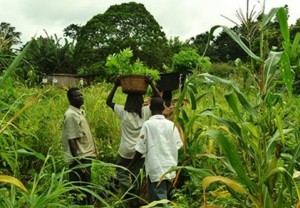Budget for agriculture not in favour of smallholder farmers – Group
 The Peasant Farmers Association of Ghana (PFAG) has urged the Government to ensure that the 2016 Annual Budget for the Agricultural sector focuses more on supporting smallholder farmers.
The Peasant Farmers Association of Ghana (PFAG) has urged the Government to ensure that the 2016 Annual Budget for the Agricultural sector focuses more on supporting smallholder farmers.
Mr Charles Nyaaba, the Programme Officer of the PFAG, made the call at a sensitisation workshop, jointly organised by the Association and SEND- Ghana in Bolgatanga to discuss the Agricultural Sector Budget.
He said smallholder farmers would not benefit much from the Budget unless special attention was given to them.
The Programme Officer explained that 90 per cent of the farming population was smallholders, with 55 per cent of them being women.
He said majority of smallholder farmers were engaged in the production of vegetables, legumes, and cereals for consumption, but he claimed that such sectors were not catered for in the 2016 Annual Budget for the Agricultural sector.
He alleged that Targeted Programmes for Women; Investment in Extension Services; Climate Resilient Agriculture; Investment in Warehousing; and Investment in Irrigation, particularly dugouts, which were very critical to the empowerment of the smallholder farmers, were all missing in the Budget for the sector.
Mr Nyaaba, however, commended the Government for the proposed good investment in fertiliser and seed subsidy.
But he kicked against the GH¢35 million allocation for the Green House Technology Capacity Building and Training Centres, and asked that the fund be rather channelled towards supporting smallholder farmers.
“This will help boost food production in the country as well as help improve upon the standard of living of the smallholder farmers who form the greatest number of farmers in the country,” he stated.
The Programme Officer of SEND- Ghana, Nana Aisha Mohammed, explained that the workshop, which was sponsored by Trust Africa, was aimed at presenting the findings of analysis of the 2016 Agriculture Sector Budget; Prospects, Challenges and Opportunities for smallholder farmers.
It was attended by stakeholders, including representatives of Civil Society Organisations, the Ministry of Food and Agriculture, Irrigation Development Authority, and the Media from the Northern, Upper East and Upper West Regions. She urged the Government to ensure that the fertiliser and seed subsidy programme benefitted mainly smallholder-farmers but not commercial farmers who had the ability to purchase inputs.
The Kassena-Nankana Municipal Chief Executive, Dr Stanislaus Alu Kandingdi, who read a speech on behalf of the Upper East Regional Minister, Mr Albert Abongo, gave the assurance that the Government would ensure that the peasant farmers benefited from the fertiliser and seed subsidy programme towards increasing food production.
“The Tono and Vea Irrigation dams are also being restructured,” he said. “After completion, the Region will take its first position as the leading supplier of vegetables in this country.
“This will help create more jobs for the youth and reduce migration to cities in search of jobs and also reduce the risk of travelling to Burkina Faso to import tomatoes leading to loss of lives.
Source: GNA
